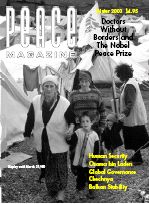
Peace Magazine Winter 2000, page 5. Some rights reserved.
Search for other articles by various here
Would there were such a straightforward solution to the problem of war as advocated by professor Rummel [Rummel shows that established democracies do not go to war with other democracies.] But Democracy is not a “simple.” It varies across nations. The bourgeois democracies of Western Europe are very different from the democracy of the U.S. Republic; both are distinct from the “democracies” of great states such as India and Japan. Statistical analysis of complex human phenomena including “war” is very tricky. Comparing the likelihood of different states engaging in war requires looking at many factors.
World War One was sadly preceded by votes in favor of war in national assemblies of a quasi-democratic sort on both sides. Hitler, of course, took power “democratically” but subverted that democracy in the run-up to World War Two. Churchill in Britain saw to it that no general election was held during that war. Was one side democratic and the other not so in the recent Balkan War? Although all the NATO powers individually have some degree of democracy, NATO’s decisions lacked democratic input. There was no vote in the U.K. parliament, and the war was run almost entirely by non-elected military. There are Serbian and “Yugoslavian” parliaments or assemblies which have voted. There are current semi-democratic discussions within the remnants of Serbia and in Montenegro. How are we to understand all this in Rummel’s terms? The human propensity to violent quarrels is an almost fixed parameter, the frequencies of different kinds of conflict (from murders to world wars), and their magnitude (numbers of participants and causualties). By all means let us improve de-mocracy in our own societies and hope that we shall thereby affect the likelihood of our going to war. But we must not assume that we have some political secret that others lack, and that, if only they were somehow to accept it, peace would break out. There is a paternalistic hubris here that makes me uncomfortable. If we think ourselves democratic then our potential enemy is not, and so any war is their “fault.” No, the search for peace must begin at home.
Mainstream media in the U.S. were aware that the Pentagon and NATO released biased information regarding the war in Kosovo, yet they continued to relay it to the audiences. Under-covered here, but widely covered in Europe, were the extensive civilian deaths, the massive damage to non-military facilities, the use of illegal cluster bombs and depleted uranium munitions, and the devastating environmental pollution.
According to a NATO inquiry, the bombing “failed to damage the Yugoslav field army tactically in Kosovo, while the strategic bombing of targets such as bridges and factories was poorly planned and executed.”
A senior French military official said, “the USAF ...intended to hit military and political targets everywhere.” Another added, “we were on a the verge of an open clash with Washington.” Twenty high-ranking judges of the Greek Council of State condemned NATO attacks, calling them violations of international law. NATO forces were repeatedly hindered as they passed through Greek soil.
The U.S. government felt foreign press coverage was so out of control it created a new International Public Information Group, made of top military, diplomatic and intelligence officials, to coordinate U.S. resources to “influence the emotions, motives, objective reasoning, and ultimately the behavior of foreign governments, organizations, gr-oups, and individuals.” This organization will attempt to squelch or limit uncomplimentary stories regarding U.S. activities and policies reported in the foreign press. It is de facto censorship, as it will use governmental resources to repress foreign news stories that might reach the American public.
How can we conclude that the media are free when they give us unsubstantiated stories of rape camps, massacres, and possibly some 100,000 Albanians missing, while the military was racking up Serbian civilian targets and keeping our allies in the dark? Only a strong system of diverse news sources, ombudsmen, and reporters with tenure rights can counterbalance governmental spin doctors and the media elite’s self interests. Anything less means a continued deterioration of informational freedom in the United States.